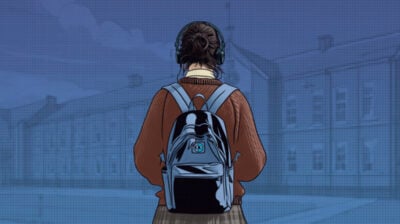How I learned to accept criticism and move on from it
Julia talks about building her self confidence and learning to be your own champion

“That project is not good enough.”
“Your ideas are not up to scratch.”
“Your writing is mediocre, it needs improving.”
“It’s okay I guess.”
We’ve all heard critical comments come from various people in our lives, whether they were invited to judge or not. People who work in creative areas such as art or writing are subjected constantly to criticism from family members, friends, teachers, colleagues, you name it. Many people in these fields of work can handle criticism well and take it on board in a healthy manner. On the other hand, there are people like me, who can let the words of others settle too much, making us overthink and even get upset.
Getting feedback on my work
I’m currently a second-year student in journalism studies at Technological University Dublin and I love it. It matches my passion of talking to people and finding out about the lives and stories of others. However, when I received my first batch of constructive critical comments on my work, I started to feel like I was in the wrong area of study. These comments came from professional lecturers who have been in the industry for years and had oodles of experience on their shoulders. I understood that they were only trying to help me improve as a journalist but somehow, I could never shake the negative comments and I always ignored the positive ones.
The good feedback always felt pointless because the negative comment stuck out too much in my head. Criticism can do that to you. It can lead you to believe that maybe you’re not doing the right thing and this can lead to anxiety over the fact that you might have made a mistake and maybe you should change your path, just because one or more people had something to say. That’s where my thought process went, it was maybe, after maybe, after maybe, I was doubting myself to a point where I considered possibly dropping out. Then I went to the one person I knew I could trust to help get my mindset in order, my mum.
Choosing to grow
I talked about dropping out and whether journalism and writing was really for me. She then proceeded to tell me that all my childhood I never stopped writing or coming up with characters and I certainly never shut up half the time. While drawing and character-creating was something I grew out of, my writing and my forever moving mouth never left me. “Accepting criticism is part of life, you can choose to grow and move on from it, or let the words get to you” she said. So, I decided to hype myself up and teach myself how to accept criticism.
You can learn this skill from any challenge or obstacle you find yourself facing in life. Take the opportunity to learn and grow from your mistakes. Realise you’re not the only one who receives bad and/or good comments. People are strong in some areas and weak in others. It takes guts to put the effort into strengthening your skillset, so in the words of the great Shia LaBeouf, “just do it!” Lecturers and teachers just want the best for you, and they want to see your improvement not your downfall, remember that.
Build your own self-confidence
Build your own self confidence. Believe in yourself as a writer, artist or trumpet player, whatever floats your boat. You might show a friend, family member or even boyfriend/girlfriend your work and they might not give you the compliments you thought you’d receive. They might even just be brutally honest with you and you might not like that. Which is why you, yourself need to believe that yes this is a good piece or good project and if someone says different, that’s fine as they have their own mind that isn’t mine. Always have good faith in your own work. Listening to the good feedback as well the constructive criticism works in a sandwich formation. It will go good comment, bad comment, good comment. This is to reassure you that your work does have good attributes and you should be proud of them. The constructive criticism is in the middle so that yes you can focus on it and edit anything to make your work better, but also so that you don’t overlook it or think it is the be-all and end-all of everything.
If someone purely only gives you bad criticism, acknowledge it, take a step back and then move on. Dwelling on one person’s bad opinion is never healthy and gets you nowhere. Take a deep look at your own work and judge it for yourself. This can be difficult, but it gets easier the more you do it. What I do for my college work and what you can do for any work whether it’s Leaving Cert essays or just a side-project you’re working on at home, is write down three good things about your work and three, not bad things, but things that can be improved. I know writing down the good things seems silly, but they’ll give you a boost while editing the things that need to be worked on.
Hope this helped some of you, hope you’re staying safe and working away on what you love!






